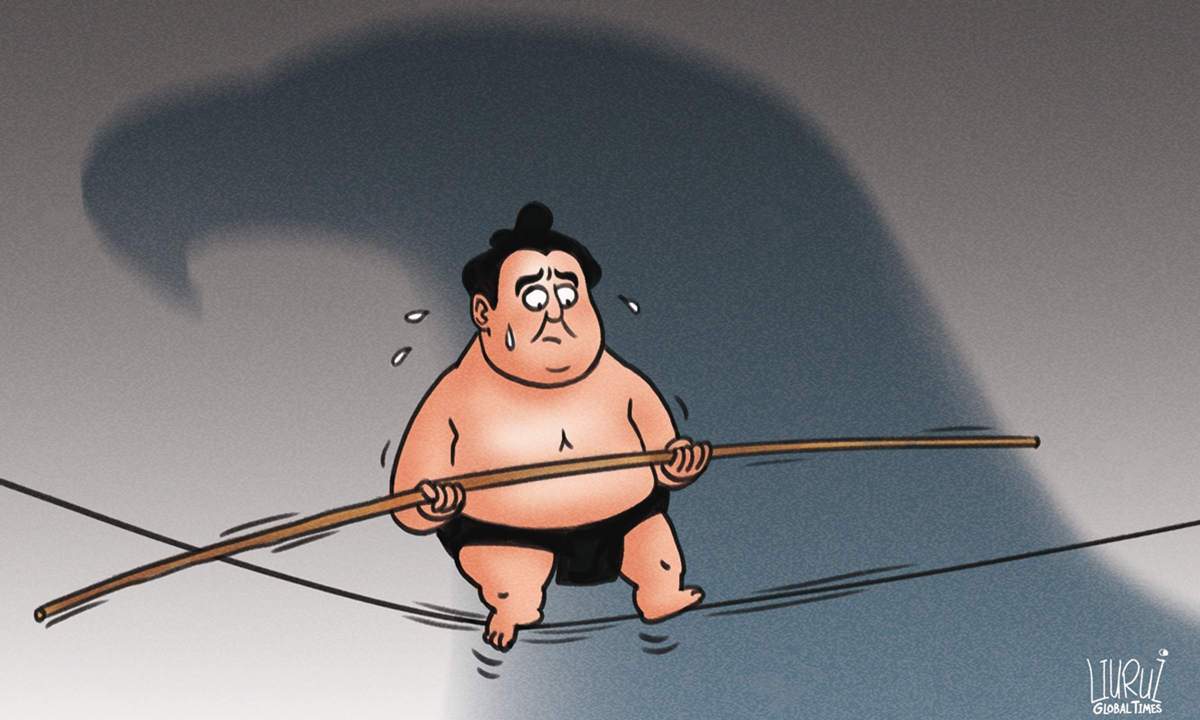
Illustration: Liu Rui/GT
Japan is one of the US allies that closely monitors Washington's position on the Taiwan question. This is reflected in a series of recent statements made by some Japanese politicians.
For example, on June 24, Japanese Defense Minister Nobuo Kishi said in an interview with Bloomberg that the security of Taiwan island was directly linked with that of Japan. Also, speaking to the Washington-based think tank Hudson Institute, Japanese deputy defence minister Yasuhide Nakayama questioned in June whether the decision to follow a one-China policy would stand the test of time. "Was it right? I don't know," he said.
But the Japanese government's positioning of Taiwan question still has not undergone a fundamental change. Some Japanese politicians try to cross China's bottom line in this regard, but this does not mean Japan's Taiwan policy has reversed fundamentally.
Now, Japan is using Taiwan as a bargaining chip to constantly test China's bottom line and serve its own geopolitical interests. This is a provocative act. Yet the Japanese government still dare not completely abandon the one-China policy, because that may directly lead to Beijing's termination of diplomatic ties with Tokyo.
In recent years, Japan and some Western countries have strengthened their sense of identity with the island of Taiwan. This is not only reflected in the COVID-19 pandemic, but also in Taiwan's political system and economy. For example, the Chinese mainland banned pineapples from Taiwan on March 1 because quarantine pests among pineapples from the island were found. Japan later ordered 6,200 tons of Taiwan-grown pineapples.
This mutual sense of identity between Japanese people and people in Taiwan is because of the public opinion of the Japanese government and media - as well as some Japanese politicians' acts. They have instigated the Japanese people and media to smear the Chinese mainland on Xinjiang and Hong Kong affairs. They are trying to use these questions to show that Taiwan island is different from the mainland in terms of the so-called democratic system.
Some people believe that the most important reason for the Japanese government's increasingly tough position on the Taiwan question is because of so-called Chinese mainland's increasingly hardline military stance against the island. Tokyo believes that Beijing's display of "muscle," including flying across the so-called middle line in the Taiwan Straits, is unacceptable. With this excuse, the defense exchanges between Japan and the Taiwan island may gradually surface. Some Japanese government officials and leaders all hope that the US and other democratic countries can protect Taiwan because they think Taiwan's position as an "unsinkable aircraft carrier" is threatened. Therefore, they have made some provocative statements, in order to send warning signals to the Chinese mainland.
The Japanese government's one-China policy will not officially change. But Tokyo will tactically use the Taiwan question as a bargaining chip and make the best use of it in many ways, including in China-Japan relations, US-Japan-South Korea relations, etc. Taking advantage of the Taiwan question, Japan hopes to create an impression that it is a community with the island of Taiwan, and to contain China's influence in the Asia-Pacific region and Northeast Asia. Tokyo also hopes to take the opportunity to increase its discourse power on the Diaoyu Islands issue.
The year 2022 marks the 50th anniversary of the normalization of China-Japan diplomatic relations. Japan's one-China policy will not be reversed in the short term, because otherwise the two countries' diplomatic ties will be severed. But Japan will undoubtedly continue to upgrade its support for Taiwan within a certain degree, and strengthen its ties with the island of Taiwan and constantly test Beijing's bottom line. However, is Tokyo confident in attracting countries such as the US and Australia to stand for Japan, or even act in concert with Japan when necessary?
Japan will not get any benefit from Washington by closely following the US' Taiwan policy. Some in the US have been talking about directly sending troops or interfering if military conflicts break out across the Taiwan Straits. There are voices in Japan calling for following the US' steps. However, Washington has not guaranteed that it will send troops, because this is a dilemma for the US. After all, can Washington bear the cost of a head-on military conflict with Beijing?
The US will maximize its own interests by making a relatively neutral choice. If Washington sends troops for the Taiwan question or the Diaoyu Islands issue, a military conflict between China and the US will be inevitable. If Washington is wise enough, it will not allow the situation to get out of control, leaving itself in a dilemma. Therefore, Japan may be too optimistic to believe that its tricks will easily succeed on the Taiwan question.
The author is director of the Institute of Northeast Asian Studies at Heilongjiang Provincial Academy of Social Sciences. opinion@globaltimes.com.cn




